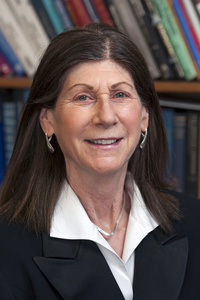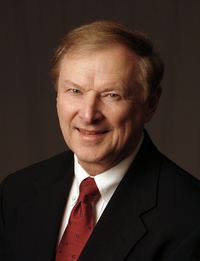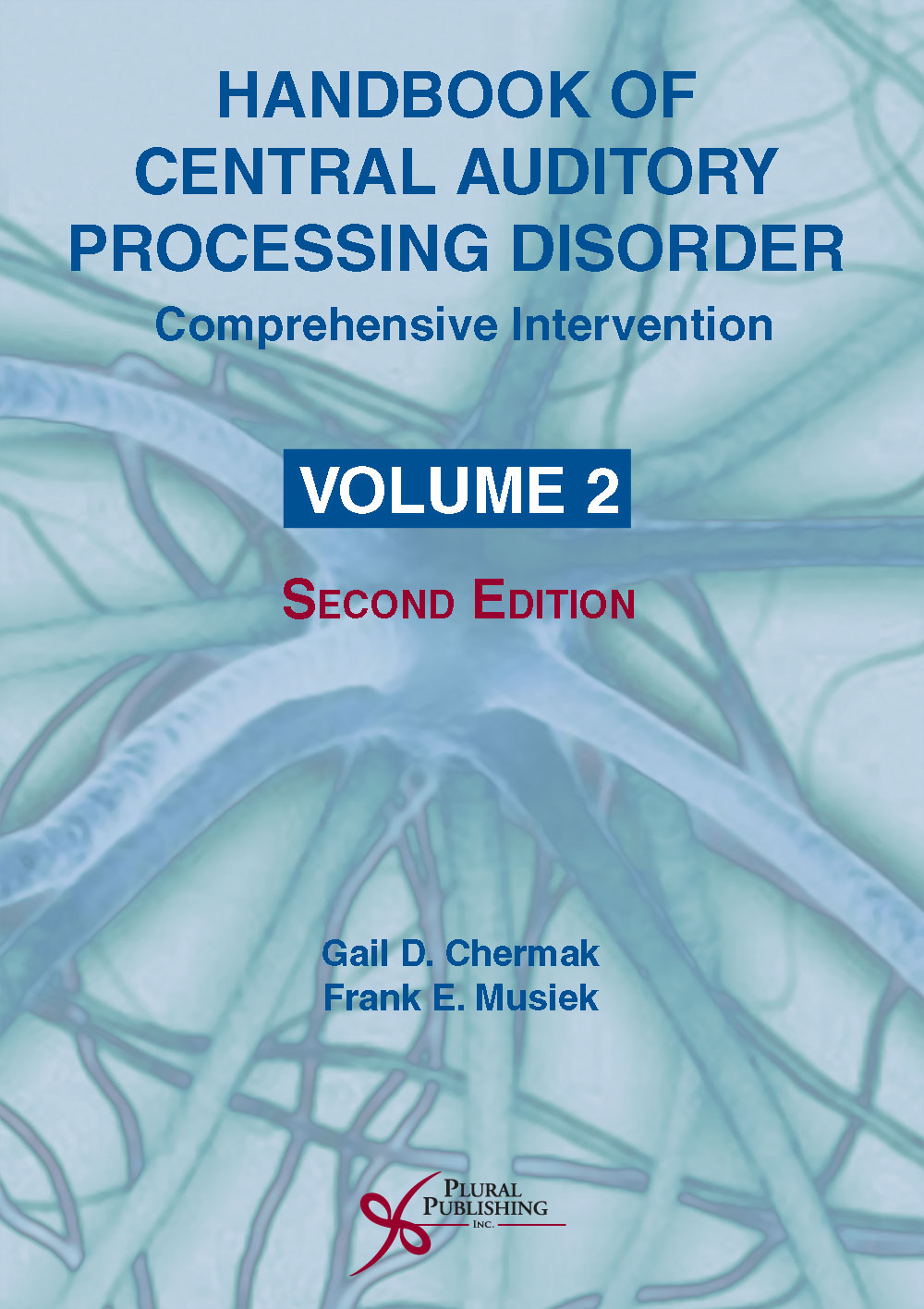
Handbook of Central Auditory Processing Disorder, Volume II: Comprehensive Intervention
Second Edition
Gail D. Chermak, Frank E. Musiek
Details: 792 pages, B&W, Hardcover, 7" x 10"
ISBN13: 978-1-59756-562-2
© 2014 | Available
For Instructors
Purchase
Chermak and Musiek's two-volume, award-winning handbooks are back in newly revised editions. Extensively revised and expanded, Volume II provides expanded coverage of rehabilitative and professional issues, detailing intervention strategies for children and adults. Volume I provides comprehensive coverage of the auditory neuroscience and clinical science needed to accurately diagnose the range of developmental and acquired central auditory processing disorders in children, adults, and older adults.
Building on the excellence achieved with the best-selling 1st editions which earned the 2007 Speech, Language, and Hearing Book of the Year Award, the second editions include contributions from world-renowned authors detailing major advances in auditory neuroscience and cognitive science; diagnosis; best practice intervention strategies in clinical and school settings; as well as emerging and future directions in diagnosis and intervention.
Exciting new chapters for Volume II include:
- Evidence Supporting Auditory Training in Children, by Jeffrey Weihing, Gail D. Chermak, Frank E. Musiek, and Teri James Bellis
- School Polices, Process, and Services for Children with CAPD. by Georgina T.F. Lynch and Cynthia M. Richburg
- Historical Foundations/Pioneers, by James W. Hall III and Anuradha R. Bantwal
- Remediation of Spatial Processing Issues in CAPD, by Sharon Cameron and Harvey Dillon
- The Dichotic Interaural Intensity Difference (DIID) Training, by Jeffrey Weihing and Frank E. Musiek
- Considerations for the Older Adult Presenting Peripheral and Central Auditory Dysfunction, by Gabrielle Saunders, M. Samantha Lewis, Dawn Konrad-Martin and M. Patrick Feeney
- Case Studies, by Annette E. Hurley and Cassandra Billiet
- Clinical and Research Issues in CAPD, by Jeffrey Weihing, Teri James Bellis, Gail D. Chermak, and Frank E. Musiek
Reviews
"The addition of several new chapters to the Handbook of Auditory Processing Disorders Volume 1 is a significant enhancement and expansion of the first edition. The general layout and writing is consistently high quality throughout the book...
The initial section on auditory neuroscience has excellent chapters by Jos Eggermont on central auditory system development and by Phillips on central auditory neuroscience. These two chapters provide a strong basic science underpinning to the remainder of the book...
Dr. Philips' chapter on psychoacoustic considerations is a relatively comprehensive review of the area. It serves as an excellent refresher for those who have not reviewed the area recently. This chapter is one of the more important chapters in the book, as the evaluation of auditory processing is the clinical adaptation of psychoacoustic test procedures. Anyone working in the area of auditory processing disorders needs to understand the underlying principles of evaluating the system and recognize those principles in the tests that they are utilizing.
The chapter by Hugdahl and Helland on dichotic listening and attention provides a detailed review of the area and ties nicely with the more clinically based Chapter 11 on dichotic listening tests. Several of the points made in this chapter have significant impact on how we should view dichotic listening tests as well as the administration of the dichotic tests to obtain maximum information. From the reviewer's perspective this chapter was one of the most thought provoking in the book and it has led to my re-evaluation of dichotic testing procedures and interpretation...
The additional chapters and modification in this edition provide a step forward in content rather than just a simple rehash of old material on CAPD. The book should be viewed as an excellent supplemental text for other areas of audiology as many of the chapters provide discussions that pertain to a wide range of audiologic concerns."
—Herbert Jay Gould, PhD, Associate Professor, School Communication Sciences and Disorders, The University of Memphis
"These books provide a wealth of evidence-based information to address the fact that, despite awareness of an auditory-specific perceptual disorder (APD or CAPD) in children and adults for more than 60 years, a consistent approach to diagnosis and treatment has yet to be determined.
Volume 1 provides information about the auditory neuroscience and clinical science needed for diagnosis; volume 2 details intervention strategies, rehabilitation and professional issues.
Both volumes emphasise the need for a multidisciplinary approach involving audiologists, SLTs, teachers, psychologists and physicians for assessment, differential diagnosis and intervention.
Case studies provide an invaluable insight for clinicians into how those with APD may present and provide a framework for assessment and intervention. Sharing relevant case studies with parents and carers could be a helpful way of offering support and hope in an area where I have found limited awareness as a clinician and parent."
—Fiona Ford, Specialist SLT, The Orchards Primary Academy, Birmingham, Roya
20Q: CAPD - Fundamentals
20Q: CAPD - Diagnosis and Intervention
Read Gail Chermak's interviews with Gus Mueller from AudiologyOnline.
Volume 2 Comprehensive Intervention
Foreword by Robert W. Sweetow
Preface
Acknowledgements
About the Editors
Contributors
Section I: Foundations
- Chapter 1. Neurobiology, Cognitive Science, and Intervention
Gail D. Chermak, Teri James Bellis, & Frank E. Musiek - Chapter 2. Evidence-Based Practice and Treatment Efficacy
Jane T. Pimentel & Ella Inglebret - Chapter 3. The Efficacy of Auditory Training in Children and Adults With Central Auditory Processing Deficits
Jeffrey Wehing, Gail D. Chermak, Frank E. Musiek, & Teri James Bellis - Chapter 4. Acoustic Foundations of Signal Enhancement and Room Acoustics
Jacek Smurzynski - Chapter 5. School Polices, Process, and Services for Children With Central Auditory Processing Disorder
Georgina T.F. Lynch & Cynthia M. Richburg - Chapter 6. Historical Foundations of Central Auditory Processing Disorder
James W. Hall III & Anuradha R. Bantwal
Section II: Interventions
- Chapter 7. Auditory Training
Frank E. Musiek, Gail D. Chermak, & Jeffrey Weihing - Chapter 8. Remediation of Spatial Processing Issues in Central Auditory Processing Disorder
Sharon Cameron & Harvey Dillon - Chapter 9. Dichotic Interaural Intensity Difference (DIID) Training
Jeffrey Weihing & Frank Musiek - Chapter 10. Central Resources Training: Cognitive, Metacognitive, and Metalinguistic Skills and Strategies
Gail D. Chermak - Chapter 11. Computer-Based Auditory Training (CBAT) for Central Auditory Processing Disorder
Linda M. Thibodeau - Chapter 12. Signal Enhancement: Personal FM and Sound-Field Technology
Carol Flexer - Chapter 13. Classroom Management: Collaboration with Families, Teachers, and Other Professionals
Jeanane M. Ferre - Chapter 14. Intervention Approaches for Adolescents and Adults With Central Auditory Processing Disorder
Jane A. Baran - Chapter 15. Considerations for the Older Adult Presenting With Peripheral (and Central) Auditory Dysfunction
Gabrielle Saunders, M. Samantha Lewis, Dawn Konrad-Martin, and M. Patrick Feeney
Section III: Multidisciplinary Perspectives on Assessment and Intervention Across The Spectrum of Related Disorders
- Chapter 16. Assessment of Individuals Suspected or Diagnosed With Central Auditory Processing Disorder: A Medical Perspective
'Doris-Eva Bamiou & Vivian Iliadou - Chapter 17. Cognitive-Communicative and Language Factors Associated With Central Auditory Processing Disorder: A Speech-Language Pathology Perspective on Assessment and Intervention
Donna Geffner & Deborah Ross-Swain - Chapter 18. Central Auditory Processing Disorder and Attention Deficit Hyperactivity Disorder: A Neuropsychological Perspective on Assessment
Art Maerlender & Lindsay Heath - Chapter 19. Central Auditory Processing Disorder and Attention Deficit Hyperactivity Disorder: A Psychological Perspective on Intervention
Warren D. Keller & Kim L. Tillery - Chapter 20. Differential Intervention for Central Auditory Processing Disorder, Attention Deficit Hyperactivity Disorder, and Learning Disability
Jeanane M. Ferre
Section IV: Case Studies
- Chapter 21. Case Studies: Intervention
Annette Hurley & Cassandra Billiet
Section V: Future Directions
- Chapter 22. Clinical and Research Issues in Central Auditory Processing Disorder
Jeffrey Weihing, Teri James Bellis, Gail D. Chermak, & Frank E. Musiek - Chapter 23. Emerging and Future Directions in Intervention for Central Auditory Processing Disorder
Gail D. Chermak & Frank E. Musiek
Glossary
Index
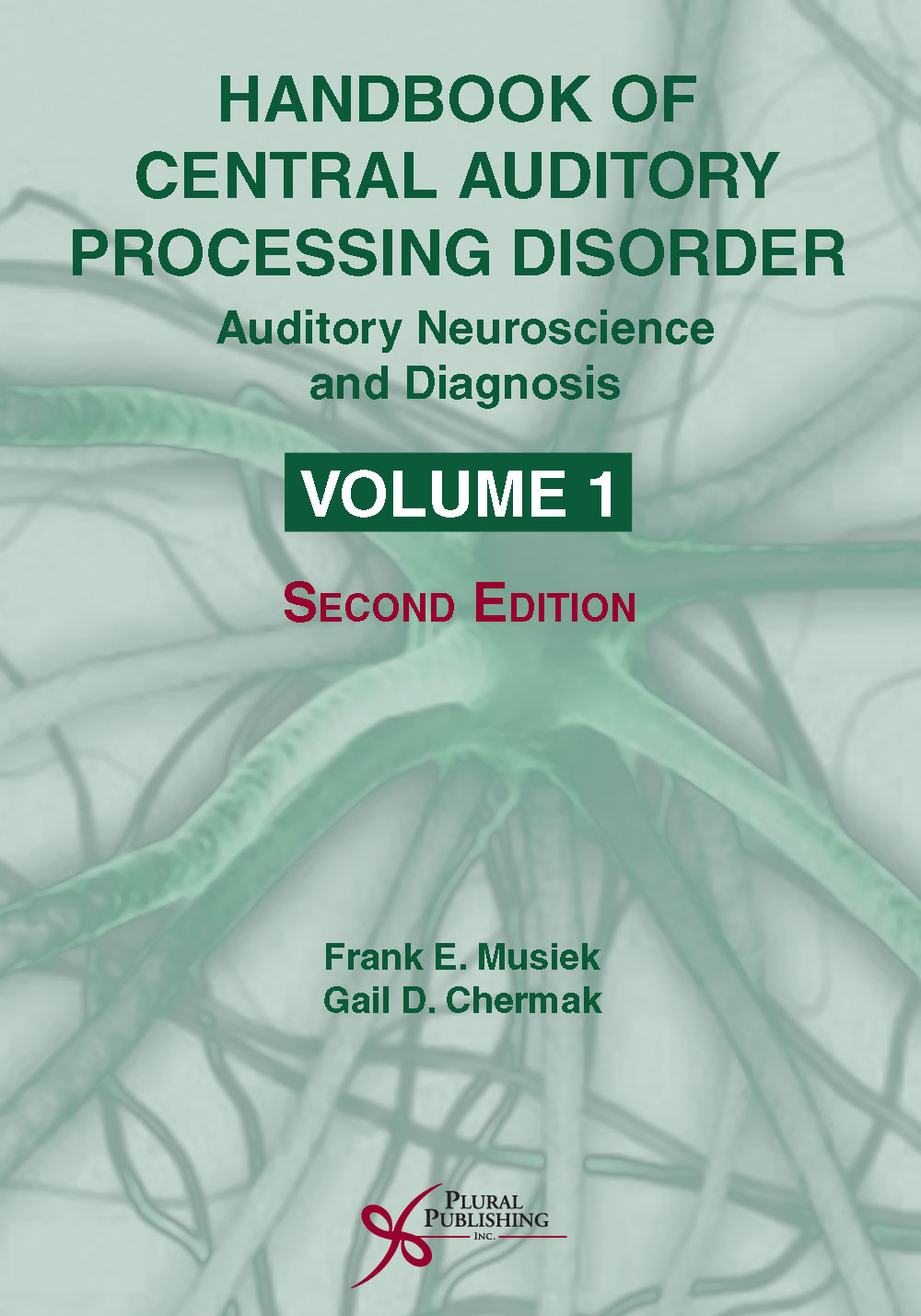
Handbook of Central Auditory Processing Disorder, Volume I: Auditory Neuroscience and Diagnosis
Second Edition
Frank E. Musiek, Gail D. Chermak
Details: 768 pages, B&W, Hardcover, 7" x 10"
ISBN13: 978-1-59756-561-5
© 2014 | Available
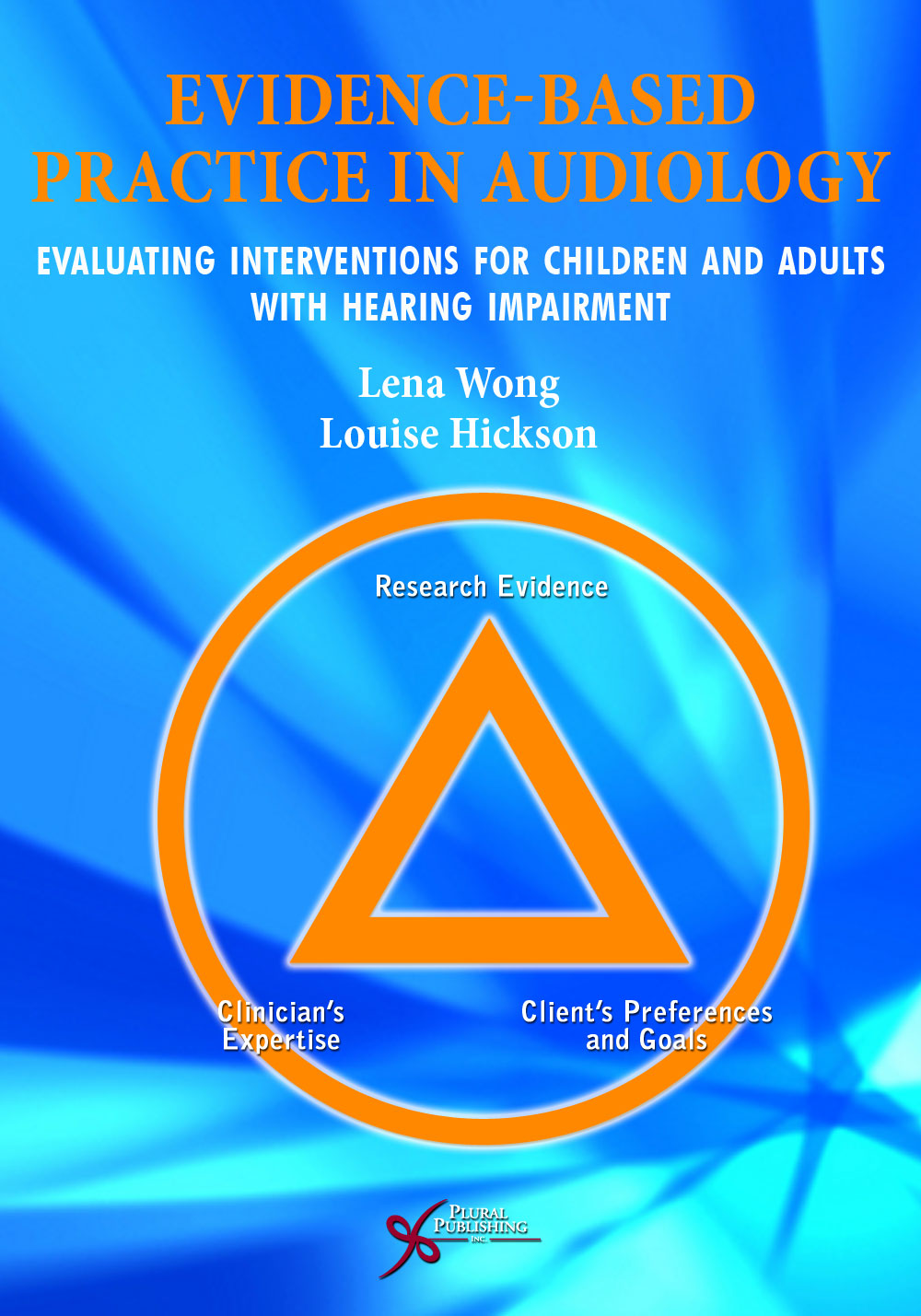
Evidence-Based Practice in Audiology: Evaluating Interventions for Children and Adults with Hearing Impairment
First Edition
Lena Wong, Louise Hickson
Details: 356 pages, B&W, Softcover, 7" x 10"
ISBN13: 978-1-59756-419-9
© 2012 | Available
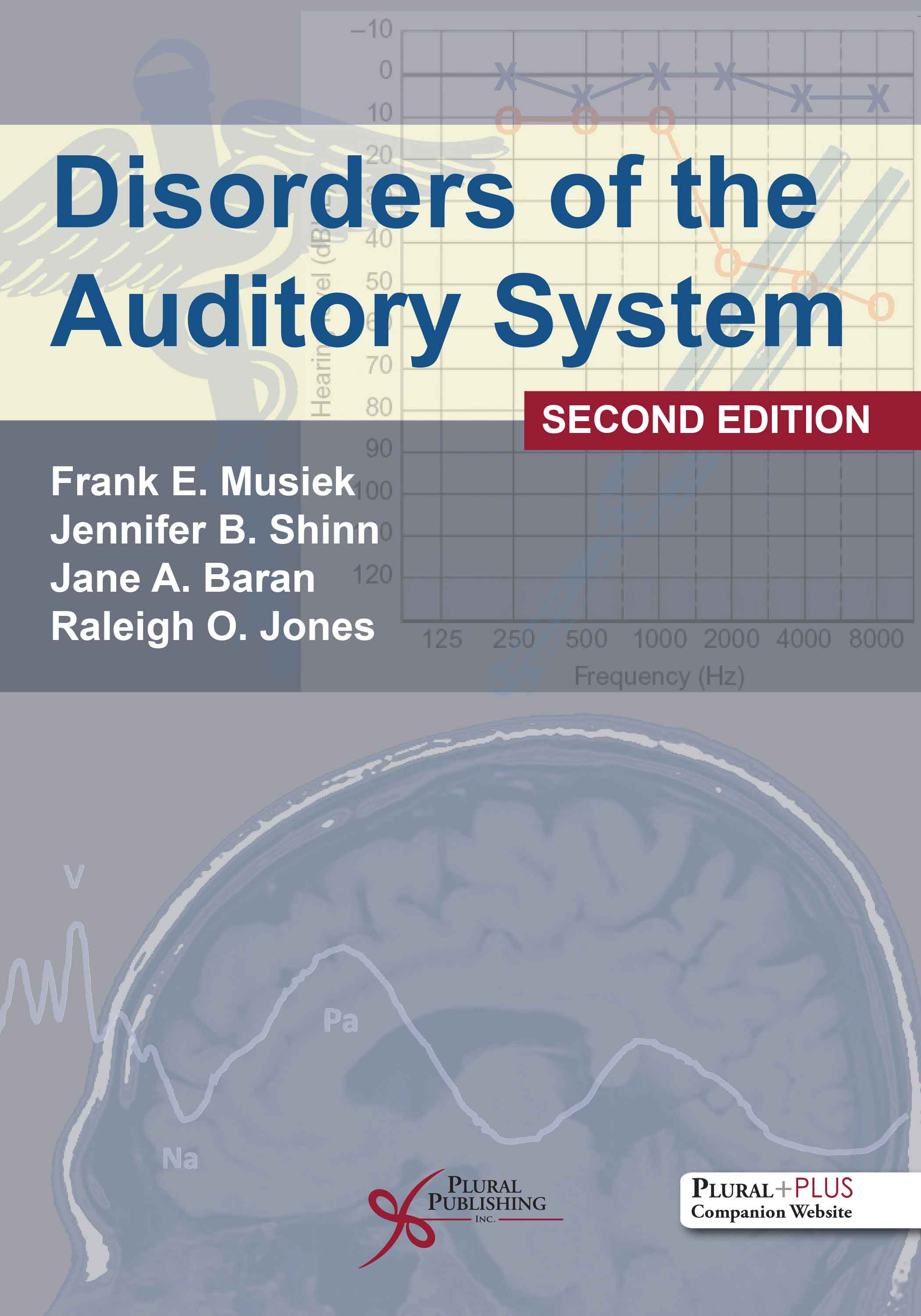
Disorders of the Auditory System
Second Edition
Frank E. Musiek, Jennifer B. Shinn, Jane A. Baran, Raleigh O. Jones
Details: 492 pages, B&W with Full Color Insert, Hardcover, 7" x 10"
ISBN13: 978-1-63550-216-9
© 2021 | Available
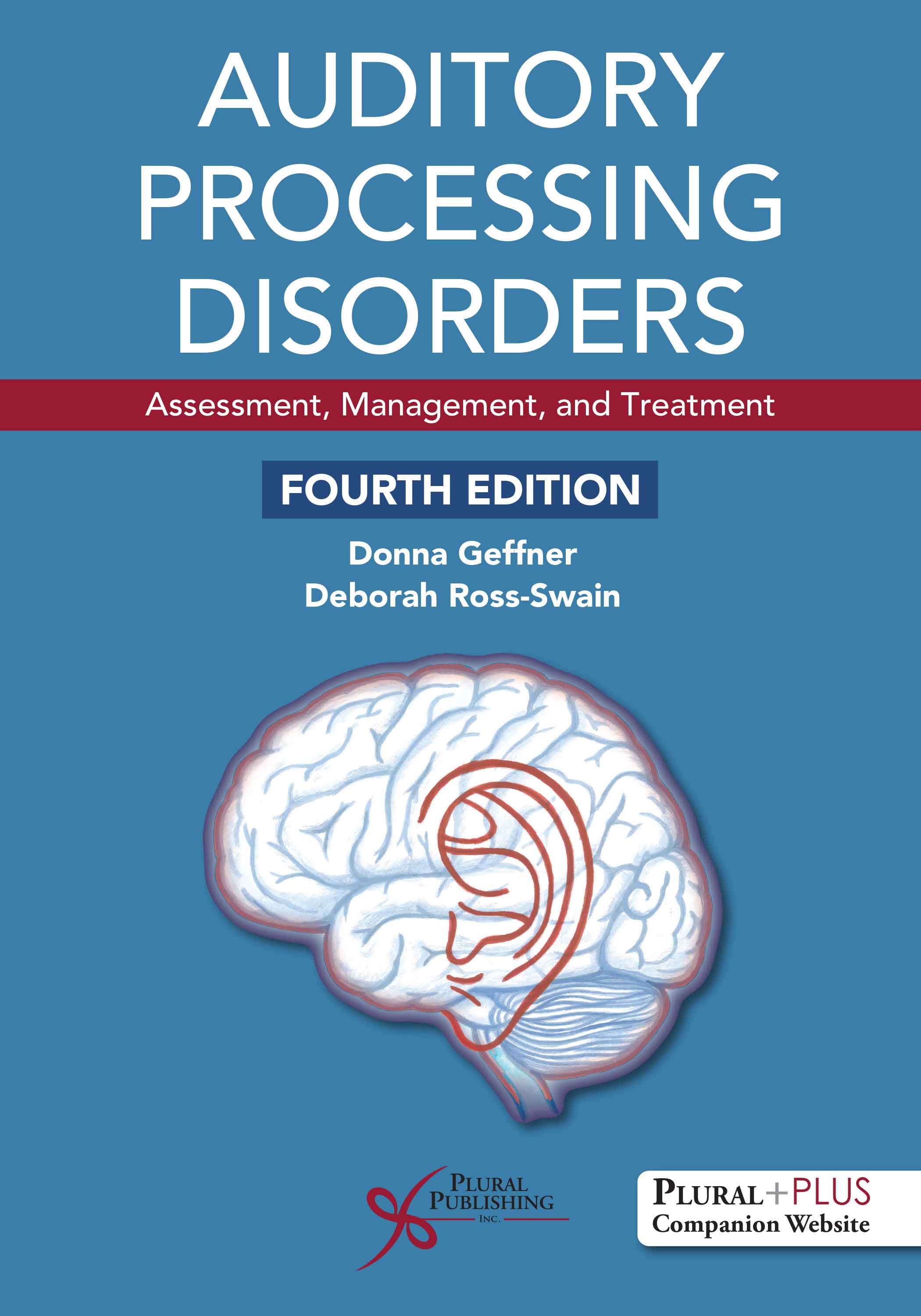
Auditory Processing Disorders: Assessment, Management, and Treatment
Fourth Edition
Donna Geffner, Deborah Ross-Swain
Details: 574 pages, B&W, Softcover, 7" x 10"
ISBN13: 978-1-63550-654-9
© 2026 | Available

